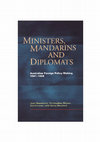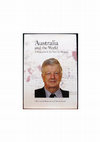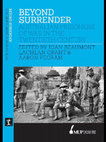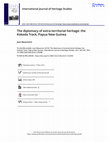Monographs by Joan Beaumont
Broken Nation: Australians in the Great War was the joint winner of the 2014 winner of the Prime ... more Broken Nation: Australians in the Great War was the joint winner of the 2014 winner of the Prime Minister's Literary Award (Australian History), the 2014 NSW Premier's Prize (Australian History), the 2014 Queensland Literary Award for History, and the Australian Society of Authors' 2015 Asher Award; and shortlisted for the 2014 WA Premier's Prize (non-fiction) and the 2014 Council for the Humanities, Arts & Social Sciences Prize for a Book.

In the three decades from the beginning of World War II Australia emerged on the world stage as a... more In the three decades from the beginning of World War II Australia emerged on the world stage as an independent actor in foreign affairs. The key institution overseeing the development of Australia's international status and foreign policy during that period was the Department of External Affairs.
This stimulating collection of essays explores the history of this government department as it grew from being a small amateur bureaucratic player to become a professional global network.
This book sheds new light on the major figures in Australian international history, H. V. 'Doc' Evatt, Percy Spender, Richard Casey, Garfield Barwick and Paul Hasluck—and their relationships with their senior bureaucratic advisers. The experiences of Australian diplomats, as they joined the Department of External Affairs as junior recruits and worked overseas, are also examined.
Ministers, Mandarins and Diplomats tells the story of the people, the events and the ideas that shaped Australian foreign policy and gave Australia its identity in the eyes of the rest of the world.
Analysis of the treatment of Australian prisoners of war on the island of Ambon in 1942, where on... more Analysis of the treatment of Australian prisoners of war on the island of Ambon in 1942, where only 30% survived. Traces their three-and-a-half years of disease, starvation, unrelenting work and executions through interviews and documentary material. The film ‘Blood Oath' was based on their story.
Edited Books by Joan Beaumont

Australia and the World celebrates the pioneering role of Neville Meaney in the formation and dev... more Australia and the World celebrates the pioneering role of Neville Meaney in the formation and development of foreign relations history in Australia and his profound influence on its study, teaching and application.
The contributors to the volume – historians, practitioners of foreign relations and political commentators, many of whom were taught by Meaney at the University of Sydney over the years – focus especially on the interaction between geopolitics, culture and ideology in shaping Australian and American approaches to the world.
Individual chapters examine a number of major themes informing Neville Meaney's work, including the sources and nature of Australia's British identity; the hapless, if dedicated, efforts of Australian politicians, public servants and intellectuals to reconcile this intense cultural identity with Australia's strategic anxieties in the Asia-Pacific region; and the sense of trauma created when the myth of ‘Britishness’ collapsed under the weight of new historical circumstances in the 1960s. They survey relations between Australia and the United States in the years after World War Two. Finally, they assess the US perceptions of itself as an ‘exceptional’ nation with a mission to spread democracy and liberty to the wider world and the way in which this self-perception has influenced its behaviour in international affairs.

Over the twentieth century 35,000 Australians suffered as prisoners of war in conflicts ranging f... more Over the twentieth century 35,000 Australians suffered as prisoners of war in conflicts ranging from World War I to Korea. What was the reality of their captivity? Beyond Surrender presents for the first time the diversity of the Australian 'behind-the-wire' experience, dissecting fact from fiction and myth from reality.
Beyond Surrender examines the impact that different types of camps, commandants and locations had on surrender, survival, prison life and the prospects of escape. It considers the attitudes of Australian governments to those who had surrendered, the work of relief agencies and the agony of families waiting at home for their husbands, brothers and fathers to be freed.
Covering several conflicts and diverse sites of captivity, Beyond Surrender showcases new research from Kate Ariotti, Joan Beaumont, Lachlan Grant, Jeffrey Grey, Karl James, Jennifer Lawless, Peter Monteath, Melanie Oppenheimer, Aaron Pegram, Lucy Robertson, Seumas Spark and Christina Twomey.
Contents:
1. Remembering and rethinking captivity
by Joan Beaumont, Lachlan Grant and Aaron Pegram
2. Bold bids for freedom: escape and Australian prisoners in Germany, 1916-18
by Aaron Pegram
3. Starvation, cruelty and neglect? Captivity in the Ottoman Empire, 1915-18
by Jennifer Lawless
4. 'At present everything is making us most anxious': families of Australian prisoners in Turkey
by Kate Ariotti
5. 'Our number one priority': the Australian Red Cross and prisoners of war in the world wars
by Melanie Oppenheimer
6. 'I hope you are not too ashamed of me': prisoners in the siege of Tobruk, 1941
by Karl James
7. Beyond the Colditz myth: Australian experiences of German captivity in World War II
by Peter Monteath
8. Australian prisoners of war of Italy in World War II: public and private histories
by Seumas Spark
9. Changi: military discipline in a Japanese prisoner-of-war camp, 1942-45
by Lucy Robertson
10. Officers and men: rank and survival on the Thai-Burma railway
by Joan Beaumont
11. Hellships, prisoner transport, and unrestricted submarine warfare in World War II
by Lachlan Grant
12. Breaking barriers: the diversity of prisoner-of-war camps in Japan and Australian contacts with Japanese civilians
by Lachlan Grant
13. Remembering captivity in the Korean War
by Jeffrey Grey, Jon MacKay and Ron Guthrie
14. Compensating prisoners of war of Japan in post-war Australia
by Christina Twomey
Defence of the nation is one of the fundamental obligations of government. For much of the first ... more Defence of the nation is one of the fundamental obligations of government. For much of the first century of the Commonwealth of Australia that obligation has been tested – in two world wars, and in a series of other military engagements. The military reputation that has grown out of these defining moments in Australian history has been a significant factor in moulding Australians' views of themselves, yet service matters have not often attracted any great degree of public interest. "The Australian Centenary History of Defence" explains the complexities of an essential strand of the Commonwealth's first century – the successes and the failures, the progress and the setbacks, in peace and war. This book is intended for general readers of military defence history titles, especially works in this series. Also military defence historians and students.

The Second World War was a dominant experience in Australian history. For the first time the coun... more The Second World War was a dominant experience in Australian history. For the first time the country faced the threat of invasion. The economy and society were mobilised to an unprecedented degree, with 550 000 men and women, or one in twelve of a population of over 7 million, serving in the armed forces overseas. Social patterns and family life were disrupted. Politically, the war gave a new legitimacy to the Australian Labor Party which had been confined to the wilderness of the Opposition at the Federal level for most of the inter-war years. The powers of the Federal government increased and a new momentum for social reform was generated at the popular and governmental level. In the international sphere, the war fundamentally shook Australian confidence in the power on which it had relied for generations, Great Britain. It generated a sense of independence in Australian foreign policy and initiated a new, if halting and problematic, realignment towards the United States.
This book considers the range of Australia's experience of this conflict, drawing together the many aspects of the war and distilling the current state of historical scholarship.
Articles by Joan Beaumont
Australia and New Zealand are linked by the memory of World War I. Their military forces, Austral... more Australia and New Zealand are linked by the memory of World War I. Their military forces, Australian and New Zealand Army Corps (Anzac), fought together ; and their shared experience at Gallipoli in 1915 generated the “Anzac legend”, a narrative which has dominated their national memories of war. However, while New Zealand adopted conscription in 1916, the Australian electorate rejected this policy option. The Australian Imperial Force remained a volunteer force. This may help explain why the Anzac legend has been more dominant in the Australian political culture than in New Zealand.

The global interest in the memory of war in recent decades has brought challenges in managing and... more The global interest in the memory of war in recent decades has brought challenges in managing and conserving extra-territorial war heritage: that is, sites of memory that have a greater significance for people outside the sovereign territory in which the sites physically reside. This article considers this issue in relation to the Kokoda Track in Papua New Guinea, a site of central importance in the Australian national memory of war. The successful conservation of the Track throws new light on the practice of heritage diplomacy. Working mostly outside the more commonly explored arena of global heritage governance, the Australian and New Guinean governments employed bilateral diplomacy to manage domestic stakeholder expectations, and thereby identified a convergence of interests and mutual gain by linking heritage protection with local development needs. They have also encouraged the construction of a narrative of the events of World War II that in some respects might be described as shared. Thus, heritage diplomacy is underpinned by a transnational consensus about the heritage’s significance, at least at the government level, which arguably divests the Kokoda Track of its exclusively “extra-territorial” quality.
Shortly after the First World War ended, Australian authorities erected memorials in France and B... more Shortly after the First World War ended, Australian authorities erected memorials in France and Belgium in memory of the Australian Imperial Force. Decades later, during the so-called ‘second generation of memory’, Australians again engaged in planting memorials on sites of memory on the Western Front. This article compares the two periods of memorial building, contrasting the sites that were chosen for commemoration and examining what these suggest about the difference between past and contemporary modes of remembering the First World War. It highlights the growing importance, in extraterritorial commemoration, of memorial diplomacy and the development of a shared memory between Australians and the communities which host their memorials.
Australia's commemorations of the First World War have thus far been massive at both the governme... more Australia's commemorations of the First World War have thus far been massive at both the government and local levels, reflecting and affirming the dominance of the memory of war and the ANZAC 'legend' in the national political culture. The commemorations in 2014-15 triggered some debate about the commodification of the memory of war and the possibility of commemoration fatigue, but the centenary of the key commemorative event, the landing at Gallipoli on 25 April, attracted large crowds and blanket media attention. Whether Australians of culturally diverse backgrounds engaged with these centenary commemorations, and how strongly they identify with the ANZAC legend as the dominant narrative of Australian nationalism, however, remains unclear.
This symposium examines how the centenary of the First World War has been
marked in five countrie... more This symposium examines how the centenary of the First World War has been
marked in five countries: Australia, France, Germany, the United Kingdom and
the United States. Given their distinctive national historical experiences and
political cultures, the metanarratives of the war in these countries differ; as does
the relationship between the state and sub-state actors in memory making.
However, in each case the commemorations of the war have been shaped by a
negotiation between the state and other agents of memory at the sub-state level.
National memory has also been consciously projected into international relations,
through carefully orchestrated anniversary ceremonies and performative memorial
diplomacy. But, despite these transnational commemorative practices, the
centenary of the war remains predominantly framed within local and national
imaginings











Uploads
Monographs by Joan Beaumont
This stimulating collection of essays explores the history of this government department as it grew from being a small amateur bureaucratic player to become a professional global network.
This book sheds new light on the major figures in Australian international history, H. V. 'Doc' Evatt, Percy Spender, Richard Casey, Garfield Barwick and Paul Hasluck—and their relationships with their senior bureaucratic advisers. The experiences of Australian diplomats, as they joined the Department of External Affairs as junior recruits and worked overseas, are also examined.
Ministers, Mandarins and Diplomats tells the story of the people, the events and the ideas that shaped Australian foreign policy and gave Australia its identity in the eyes of the rest of the world.
Edited Books by Joan Beaumont
The contributors to the volume – historians, practitioners of foreign relations and political commentators, many of whom were taught by Meaney at the University of Sydney over the years – focus especially on the interaction between geopolitics, culture and ideology in shaping Australian and American approaches to the world.
Individual chapters examine a number of major themes informing Neville Meaney's work, including the sources and nature of Australia's British identity; the hapless, if dedicated, efforts of Australian politicians, public servants and intellectuals to reconcile this intense cultural identity with Australia's strategic anxieties in the Asia-Pacific region; and the sense of trauma created when the myth of ‘Britishness’ collapsed under the weight of new historical circumstances in the 1960s. They survey relations between Australia and the United States in the years after World War Two. Finally, they assess the US perceptions of itself as an ‘exceptional’ nation with a mission to spread democracy and liberty to the wider world and the way in which this self-perception has influenced its behaviour in international affairs.
Beyond Surrender examines the impact that different types of camps, commandants and locations had on surrender, survival, prison life and the prospects of escape. It considers the attitudes of Australian governments to those who had surrendered, the work of relief agencies and the agony of families waiting at home for their husbands, brothers and fathers to be freed.
Covering several conflicts and diverse sites of captivity, Beyond Surrender showcases new research from Kate Ariotti, Joan Beaumont, Lachlan Grant, Jeffrey Grey, Karl James, Jennifer Lawless, Peter Monteath, Melanie Oppenheimer, Aaron Pegram, Lucy Robertson, Seumas Spark and Christina Twomey.
Contents:
1. Remembering and rethinking captivity
by Joan Beaumont, Lachlan Grant and Aaron Pegram
2. Bold bids for freedom: escape and Australian prisoners in Germany, 1916-18
by Aaron Pegram
3. Starvation, cruelty and neglect? Captivity in the Ottoman Empire, 1915-18
by Jennifer Lawless
4. 'At present everything is making us most anxious': families of Australian prisoners in Turkey
by Kate Ariotti
5. 'Our number one priority': the Australian Red Cross and prisoners of war in the world wars
by Melanie Oppenheimer
6. 'I hope you are not too ashamed of me': prisoners in the siege of Tobruk, 1941
by Karl James
7. Beyond the Colditz myth: Australian experiences of German captivity in World War II
by Peter Monteath
8. Australian prisoners of war of Italy in World War II: public and private histories
by Seumas Spark
9. Changi: military discipline in a Japanese prisoner-of-war camp, 1942-45
by Lucy Robertson
10. Officers and men: rank and survival on the Thai-Burma railway
by Joan Beaumont
11. Hellships, prisoner transport, and unrestricted submarine warfare in World War II
by Lachlan Grant
12. Breaking barriers: the diversity of prisoner-of-war camps in Japan and Australian contacts with Japanese civilians
by Lachlan Grant
13. Remembering captivity in the Korean War
by Jeffrey Grey, Jon MacKay and Ron Guthrie
14. Compensating prisoners of war of Japan in post-war Australia
by Christina Twomey
This book considers the range of Australia's experience of this conflict, drawing together the many aspects of the war and distilling the current state of historical scholarship.
Articles by Joan Beaumont
marked in five countries: Australia, France, Germany, the United Kingdom and
the United States. Given their distinctive national historical experiences and
political cultures, the metanarratives of the war in these countries differ; as does
the relationship between the state and sub-state actors in memory making.
However, in each case the commemorations of the war have been shaped by a
negotiation between the state and other agents of memory at the sub-state level.
National memory has also been consciously projected into international relations,
through carefully orchestrated anniversary ceremonies and performative memorial
diplomacy. But, despite these transnational commemorative practices, the
centenary of the war remains predominantly framed within local and national
imaginings
This stimulating collection of essays explores the history of this government department as it grew from being a small amateur bureaucratic player to become a professional global network.
This book sheds new light on the major figures in Australian international history, H. V. 'Doc' Evatt, Percy Spender, Richard Casey, Garfield Barwick and Paul Hasluck—and their relationships with their senior bureaucratic advisers. The experiences of Australian diplomats, as they joined the Department of External Affairs as junior recruits and worked overseas, are also examined.
Ministers, Mandarins and Diplomats tells the story of the people, the events and the ideas that shaped Australian foreign policy and gave Australia its identity in the eyes of the rest of the world.
The contributors to the volume – historians, practitioners of foreign relations and political commentators, many of whom were taught by Meaney at the University of Sydney over the years – focus especially on the interaction between geopolitics, culture and ideology in shaping Australian and American approaches to the world.
Individual chapters examine a number of major themes informing Neville Meaney's work, including the sources and nature of Australia's British identity; the hapless, if dedicated, efforts of Australian politicians, public servants and intellectuals to reconcile this intense cultural identity with Australia's strategic anxieties in the Asia-Pacific region; and the sense of trauma created when the myth of ‘Britishness’ collapsed under the weight of new historical circumstances in the 1960s. They survey relations between Australia and the United States in the years after World War Two. Finally, they assess the US perceptions of itself as an ‘exceptional’ nation with a mission to spread democracy and liberty to the wider world and the way in which this self-perception has influenced its behaviour in international affairs.
Beyond Surrender examines the impact that different types of camps, commandants and locations had on surrender, survival, prison life and the prospects of escape. It considers the attitudes of Australian governments to those who had surrendered, the work of relief agencies and the agony of families waiting at home for their husbands, brothers and fathers to be freed.
Covering several conflicts and diverse sites of captivity, Beyond Surrender showcases new research from Kate Ariotti, Joan Beaumont, Lachlan Grant, Jeffrey Grey, Karl James, Jennifer Lawless, Peter Monteath, Melanie Oppenheimer, Aaron Pegram, Lucy Robertson, Seumas Spark and Christina Twomey.
Contents:
1. Remembering and rethinking captivity
by Joan Beaumont, Lachlan Grant and Aaron Pegram
2. Bold bids for freedom: escape and Australian prisoners in Germany, 1916-18
by Aaron Pegram
3. Starvation, cruelty and neglect? Captivity in the Ottoman Empire, 1915-18
by Jennifer Lawless
4. 'At present everything is making us most anxious': families of Australian prisoners in Turkey
by Kate Ariotti
5. 'Our number one priority': the Australian Red Cross and prisoners of war in the world wars
by Melanie Oppenheimer
6. 'I hope you are not too ashamed of me': prisoners in the siege of Tobruk, 1941
by Karl James
7. Beyond the Colditz myth: Australian experiences of German captivity in World War II
by Peter Monteath
8. Australian prisoners of war of Italy in World War II: public and private histories
by Seumas Spark
9. Changi: military discipline in a Japanese prisoner-of-war camp, 1942-45
by Lucy Robertson
10. Officers and men: rank and survival on the Thai-Burma railway
by Joan Beaumont
11. Hellships, prisoner transport, and unrestricted submarine warfare in World War II
by Lachlan Grant
12. Breaking barriers: the diversity of prisoner-of-war camps in Japan and Australian contacts with Japanese civilians
by Lachlan Grant
13. Remembering captivity in the Korean War
by Jeffrey Grey, Jon MacKay and Ron Guthrie
14. Compensating prisoners of war of Japan in post-war Australia
by Christina Twomey
This book considers the range of Australia's experience of this conflict, drawing together the many aspects of the war and distilling the current state of historical scholarship.
marked in five countries: Australia, France, Germany, the United Kingdom and
the United States. Given their distinctive national historical experiences and
political cultures, the metanarratives of the war in these countries differ; as does
the relationship between the state and sub-state actors in memory making.
However, in each case the commemorations of the war have been shaped by a
negotiation between the state and other agents of memory at the sub-state level.
National memory has also been consciously projected into international relations,
through carefully orchestrated anniversary ceremonies and performative memorial
diplomacy. But, despite these transnational commemorative practices, the
centenary of the war remains predominantly framed within local and national
imaginings